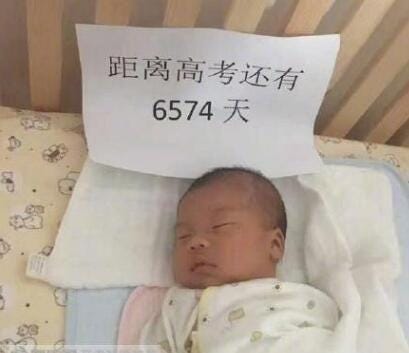Normal view
China: Land of fakeducation
Chinese culture places heavy value on one’s academic successes, stemming partly from the country’s long history around education, and this is one of the underlying factors that makes Gaokao (the college entrance exam) so notoriously difficult. Similar situations can be seen across different societies with affinities to Chinese culture. In South Korea, students are trapped in a lifetime of study and stress never ends. The Singaporean education system excels in global rankings but its students are struggling to cope under relentless pressure and stress. Seeing examples outside China, thus, it is hardly surprising that students in China from a young age has been pushed towards various types of tutoring or extracurricular classes, in order to better their grades or explore their ‘passion’.
What really ends up happening, is the even though these extracurricular activities might indeed help the child to explore their passion, more often than not, it is what the parent wants for themselves as a bragging right, rather than genuine care for their child. In China, face (roughly the equivalent of honor) is taken with the highest regard. For your child to stay behind in schools, in their education, combines the two all-important elements of face with academic successes, thus, not acceptable.
Do the tutoring classes and extracurricular classes such as piano lessons, and as a growing trend, competitions such as math competition, robotics competition etc., really benefit one’s overall education and life?
Let’s begin on exploring the impacts of extracurricular classes. There are many stories that an ethnic Chinese parent forces their child to do piano or violin lessons and the child ends up hating it, so I will not elaborate on those. Instead, let’s look at the competitions. A robotics competition aimed at teens and pre-teens that I went to recently went to is a perfect example of this. Do primary school students in the lower grade have the mental capacity to develop a program? Sure there are exceptions but for the majority of the population, no. Children around this age also often lack other crucial capacities such as having enough patience and determination to pursue a complex project thoroughly. One reason for this is because biologically, the human brain takes an awful amount of time to fully develop. Whatever benefits (when these benefits are actual and not just perceived) that these classes offer, even when retained later in life, are not always useful. What usually ends up happening, is that the children are fed knowledge, instructed by their teachers to perform tasks that often they themselves have no idea, no interest, in the task itself or the meaning behind it.
Now I sound like against all sorts of extracurricular classes and tutoring classes, but this is not the case. They do offer some benefits, at the very least many extracurricular activities are things a child would enjoy, tutoring classes can help a child understand knowledge that they were not able to grasp during school time. What is happening in China, however, is on . As most parents do not sign their children up for these classes as a result of them wanting their child to enjoy the classes or understand what they couldn’t in class, but rather a desire for their children to come up on top compared to others of the same age.

This fierce competition can sometimes lead to bizarre outcomes. This might have been a parody, but is not far stretched from the reality. The Chinese state television network has produced a documentary series on Gaokao that is also uploaded to YouTube, and you can have a more in-depth view of how pierce the competition is.
The true picture in China involves parents that are desperate to get their kids more ‘education’ in order to have a competitive edge, children often overloaded and tired, and the ‘educational agencies’ that are racking up in cash.
These agencies promise to teach your child knowledge, life skills and more. Of course all they want is some handsome amount of cash, but you would do everything for your child’s future, so you would pay for whatever that betters your child’s future, no matter how ridiculous the class sounds. All an agency need is a syllabus that involves words that the parents cannot understand, teachers working there that promises you that the knowledge that they are teaching there is invaluable for your child’s future, and if a foreign teacher (preferably white) is there, it would have been even better.
Thus, begins the enslavement.
You have become a slave that needs to pay those invoices sent by the ‘educational agency’, and your child has their time and childhood taken away from them. The slave master is not worried about a parent or two that decides to escape this slavery, there will almost certainly be more parents ready to sign the voluntary slavery contract.
Chinese parents believe that the ‘slavery’ is freedom, freedom for their children to choose in the future, but in reality, they hardly even have the freedom to not choose the option of voluntary slavery. From primary school and even kindergarten (and in Hong Kong, even before kindergarten), parents around you have been signing their kids’ childhood away form them in droves, and teachers are encouraging you to do so as well, with sayings such as ‘the summer vocation is the best time to catch up and surpass other students’ going around, how can you be so defiant of the system that is not beneficial to you?
After all, while your life is bound by endless responsibilities, your child is just starting out in life, and have an infinite number of possibilities and unlimited growth potential. How can someone be so cruel to not give them that tiny amount of money and rod your child of their infinitely bright future?
Shut up, and pay up.
